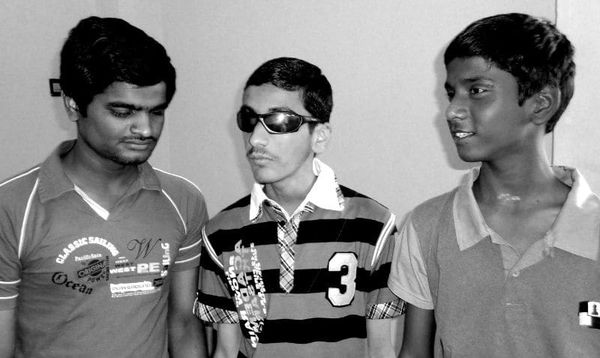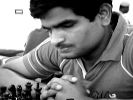Eye For Film >> Movies >> Algorithms (2013) Film Review
Algorithms
Reviewed by: Rebecca Naughten

Nominated in the newcomer category at the Grierson Awards earlier this year, Ian McDonald's debut feature documentary continues his explorations of the cultures of sporting outsiders, as previously manifested in his short films. Algorithms takes as its subject the phenomenon of Blind Chess in India, following three youngsters representing India in the World Blind Chess Championships in Stockholm, Belgrade, and Rhodes between 2009 and 2011.
Still in their teens, Darpan, Anant, and SaiKrishna are marked out as potential star players - Darpan being unbeaten as a junior until the opening match of the film where SaiKrishna unexpectedly wins out. By chance rather than design - as explained by McDonald in a Q&A after a screening in Newcastle - not only do the three represent different regions and socio-economic backgrounds, but also varying levels of sightedness (caused by different factors in each case). There is a broad spectrum of visual impairment - something of a contentious issue among the fully blind players given the inclusion of the partially-sighted in the championships. While Darpan and Anant are fully blind, SaiKrishna (the youngest of the three) can currently see but is losing his sight.

Aside from chess, a commonality between the different lives of the protagonists is the catch in their parents' voices as each family explains how their child came to lose their sight and their worries for their sons' futures. This is not pushy-parent syndrome in action - in fact, Anant's game deteriorates in part because his parents do not see the same value in chess that they can see in education as a route out of poverty - and the boys are shown to be part of caring family units.
Within this context, the fourth protagonist of the film is Charudatta 'Charu' Jadhav - himself a former Blind Chess champion - the man who shepherds the three young players through the championships with a combination of quietly-spoken attentiveness and no-nonsense bluntness. Charu wants to develop the infrastructure of the sport within India to allow every blind child the opportunity to learn to play chess - a game played in the mind, it is a level playing field between the blind and the sighted - so that those with talent can be nurtured. He is in search of an Indian player with the potential to be the first blind Grandmaster.
The initially oblique title is applicable to both chess and blindness. An algorithm is a method of calculation, a finite set of procedures or actions leading to an end state. We see the boys memorising entire chess matches, but also having to learn to think three or four moves ahead in order to outmanoeuvre their opponents, something that is mirrored in the level of pre-planning involved in navigating the world without sight. We hear Anant guiding the official who is ostensibly leading him home by telling him the visual markers to look out for (a shop, a gate), and later Charu makes his way around the hotel, trailing his fingers along the surfaces of the walls and counting doorways until he arrives at his destination.
The tactile nature of the visually impaired world is amplified by the visual style of the film, which emphasises surfaces - walls, skin, eyes - through close-ups but also in the way that the black and white (a decision taken during the editing process - it was filmed in colour) throws textures into relief. The close-ups of the chessboards - with the boys' fingers fluttering amongst the pieces with rapid dexterity or their faces hovering mere inches above the board - highlight both the adapted tactility of the boards (there are pegholes for the pieces to sit in, the black squares are raised, and the black pieces have a small nub on the top) and sculptural nature of chess pieces. The closeness of the camera - particularly the tight close-ups of each boy's face during their respective games - also heightens the tension during the championship sequences.
The boys have their ups and downs around the chessboard but McDonald does not engineer an artificial narrative arc of triumph out of adversity, and the film allows each boy to follow his own path without judgement. The film echoes the curiosity of its personable protagonists who analyse their own games - and question their winning opponents - with admirable detachment. The inspirational Charu comments that we learn more when things go wrong, and his young charges win and lose with equal grace - as the boys say to each of their opponents, "well played".
Reviewed on: 13 Dec 2014















